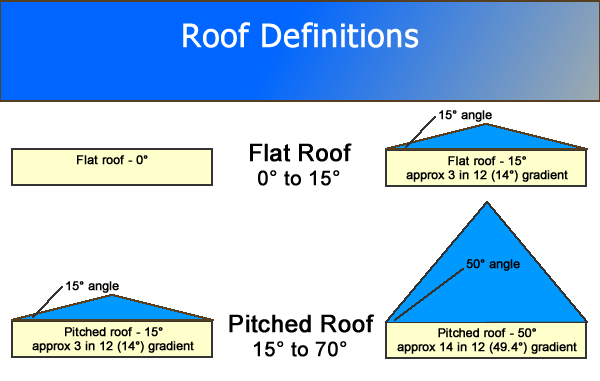It is uncommon to find a roof below 15 but for those very low pitch applications there are interlocking clay pantiles available suitable for use down to 12 5.
Minimum roof pitch uk building regs.
It also requires that roof coverings are fixed correctly.
This means for every 12 horizontal units the roof must rise a minimum of two and one half vertical units.
This will inevitably result in fixing calculations being required and complied with for all roofing projects covered by building regulations.
The first decision is whether to insulate a pitched roof at ceiling or rafter level.
If it s going to be used infrequently for maintenance only the requirements will differ from a skylight meant to provide regular rooftop access.
In accordance with the guidance in bs 8000 part 6 which in turn direct users to the wind uplift calculations in bs 5534.
Minimum roof slope roof pitch r905 3 2.
With regards to the pitch the building standard code bs 5534 recommends a minimum pitch of 200 for slate roofs.
Choosing the right pitch.
Clay and concrete roof tiles can only be installed on roof slopes of 2 1 2 12 or greater.
The justification for roof access informs which aspects of the building regulations apply and which safety measures you should employ.
Flat roof drainage.
To enable compliance with the requirements of the building regulations to be demonstrated full details of the new roof will be needed including.
35 is considered to be the minimum for slate and clay but if you do need to go below this interlocking concrete tiles are the best option.
How to insulate a roof.
Traditionally a minimum roof pitch of 20 was recommended in bs 5534 but modern tiles and slates have now been designed for applications as low as 15.
Pitch roof this is where tiles or slates are used and a void is usually created underneath.
The limiting u value the maximise u value which cannot be exceeded required under current building regulations for the roof is 0 20w m.
But since there is still a wide variety of slate roofing systems there are occasions when the minimum pitch can go down to as low as 15 0 depending on the uniqueness of the roof.
The current trend is for a warm roof where insulation is installed between the rafters thereby keeping the roof timbers warm.
Deciding on the correct roof pitch for your home very much depends on the style of house you are building or renovating and to a lesser extent your local area.
In addition roofs must provide good thermal insulation and prevent the spread of fire from adjacent or adjoining properties.
The function of a roof is to protect the building below from the weather.
In order to satisfactorily fulfil this function over a period of years it must be strong stable and durable.



























